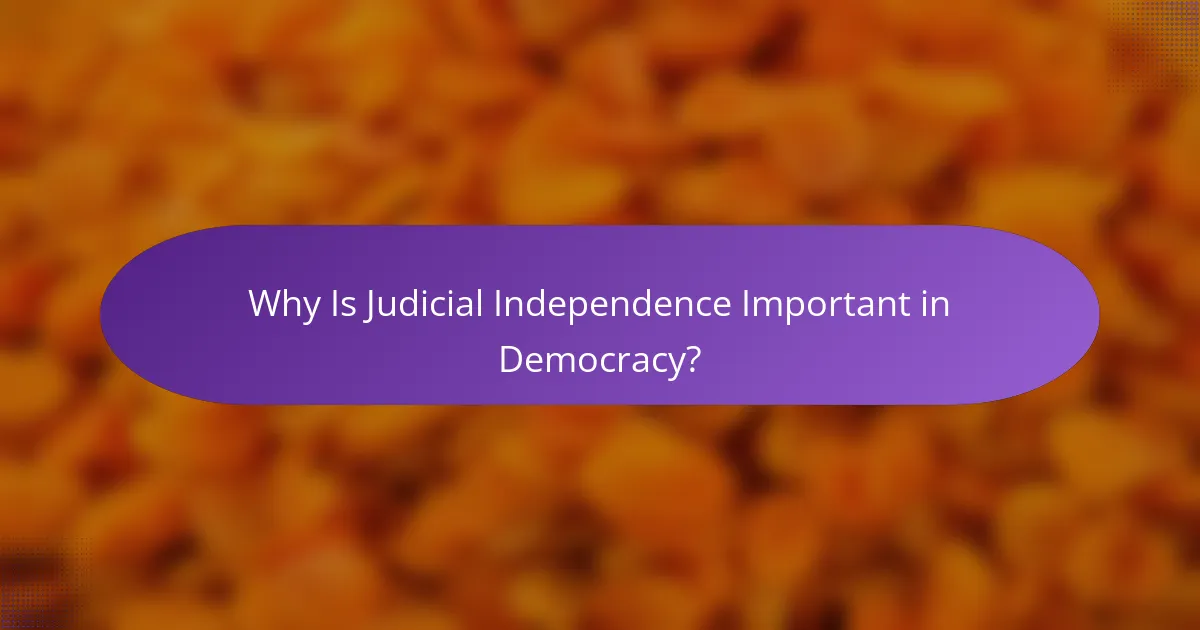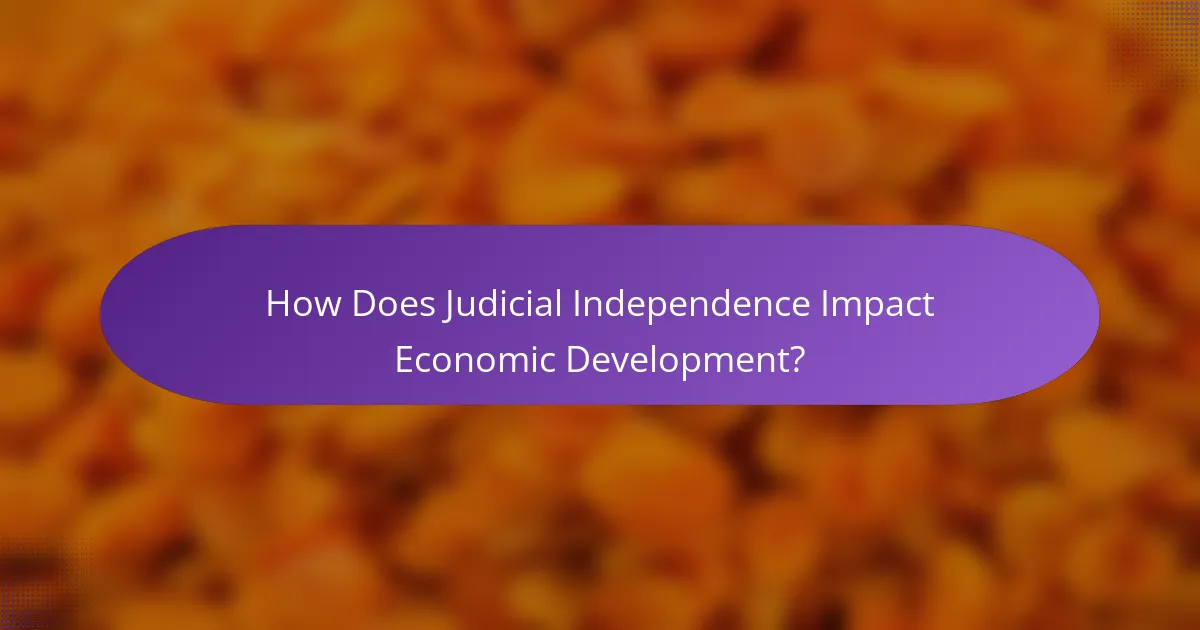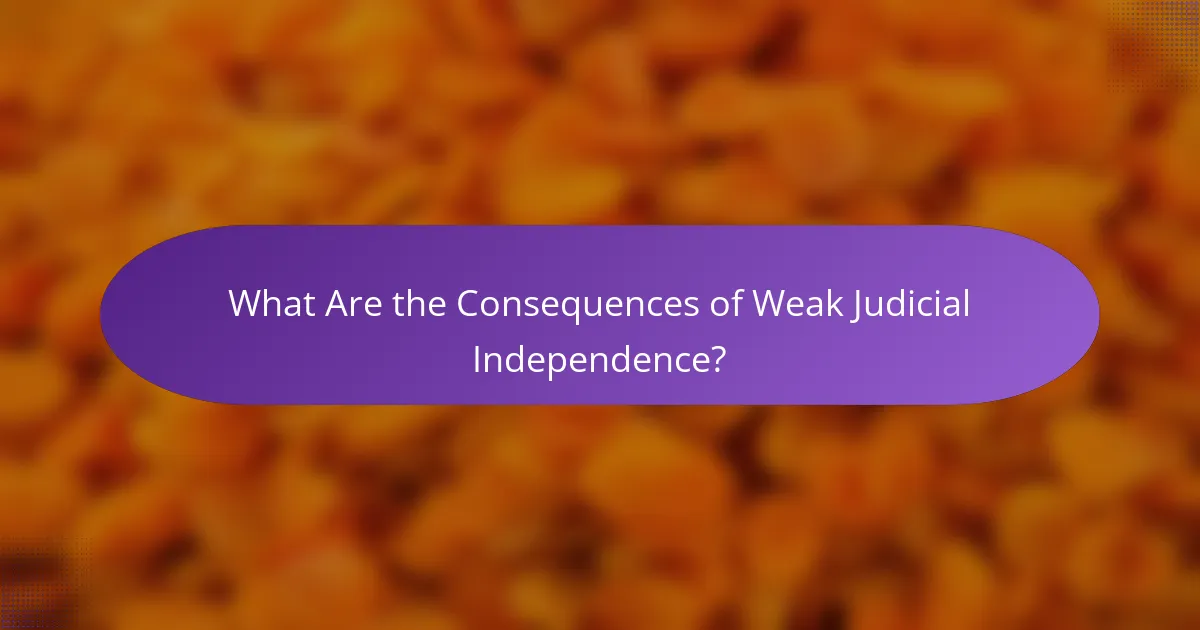Judicial independence is a cornerstone of democracy, enabling courts to make unbiased decisions without external influences, particularly from governmental entities. This autonomy is vital for upholding the rule of law and safeguarding individual rights, thereby contributing to a fair and equitable society. However, challenges such as political interference and corruption threaten this independence, necessitating robust measures to reinforce the judiciary’s integrity and impartiality.

Why Is Judicial Independence Important in Democracy?
Judicial independence is crucial in a democracy as it ensures that courts can make impartial decisions free from external pressures, particularly from the government. This independence upholds the rule of law and protects individual rights, fostering a fair and just society.
Ensures fair legal proceedings
Judicial independence guarantees that legal proceedings are conducted fairly, allowing judges to make decisions based solely on the law and the facts of each case. This impartiality is essential for maintaining a balanced legal system where all individuals, regardless of their status, receive equal treatment under the law.
For example, in a system with strong judicial independence, a judge can rule against a powerful government entity without fear of retaliation or pressure. This protects the rights of citizens and reinforces the integrity of the legal process.
Protects against government overreach
Judicial independence serves as a critical check on government power, preventing overreach and abuse. When judges are free from political influence, they can challenge laws or actions that infringe on individual rights or violate constitutional principles.
In many democracies, courts have struck down legislation that overstepped governmental authority, illustrating how an independent judiciary can safeguard citizens’ freedoms. This balance is vital for maintaining democratic governance and protecting civil liberties.
Maintains public trust in the legal system
Public trust in the legal system hinges on the perception of judicial independence. When citizens believe that judges are unbiased and free from outside influence, they are more likely to respect court decisions and engage with the legal system.
To foster this trust, it is essential for judicial appointments to be transparent and merit-based, minimizing political interference. Regular assessments of judicial performance and accountability can further enhance public confidence in the judiciary’s role in democracy.

What Challenges Does Judicial Independence Face?
Judicial independence encounters several significant challenges that can undermine its effectiveness and integrity. Key issues include political interference, corruption within the judiciary, and a lack of funding and resources.
Political interference
Political interference occurs when government entities attempt to influence judicial decisions or appointments. This can manifest through pressure on judges to rule in favor of certain political agendas or through threats to their positions.
Such interference can erode public trust in the judiciary, leading to perceptions of bias and unfairness. For example, in some countries, judges may face repercussions for rulings that contradict government interests, which can deter impartial decision-making.
Corruption within the judiciary
Corruption within the judiciary undermines the principle of justice by allowing personal gain to influence judicial outcomes. This can include bribery, favoritism, or collusion with external parties.
When corruption is prevalent, it can lead to unequal access to justice, where wealthier individuals or entities can manipulate the system to their advantage. Addressing corruption requires robust oversight mechanisms and accountability measures to ensure judicial integrity.
Lack of funding and resources
A lack of funding and resources can severely limit the judiciary’s ability to function effectively. Insufficient budgets can lead to inadequate staffing, outdated technology, and limited access to legal resources.
In many jurisdictions, this can result in delayed cases and overwhelmed courts, ultimately affecting the quality of justice delivered. Ensuring adequate funding and resource allocation is essential for maintaining an independent and effective judiciary.

How Can Judicial Independence Be Strengthened?
Judicial independence can be strengthened through a combination of transparent appointment processes, enhanced training for judges, and increased public awareness. These strategies help ensure that the judiciary remains impartial and free from external pressures, which is essential for a functioning democracy.
Implementing transparent appointment processes
Transparent appointment processes for judges are crucial for maintaining judicial independence. Clear criteria and procedures help prevent political interference and promote public trust in the judiciary. Countries can adopt merit-based selection systems, where candidates are evaluated based on qualifications and experience rather than political connections.
For example, some nations utilize independent commissions to recommend judicial appointments, ensuring that the selection process is fair and objective. This can include public hearings and feedback mechanisms to enhance accountability.
Enhancing judicial training and education
Judicial training and education play a vital role in reinforcing judicial independence. Ongoing professional development helps judges stay updated on legal standards, human rights, and ethical considerations. This training can include workshops, seminars, and access to legal resources that promote best practices in judicial decision-making.
Additionally, incorporating modules on the importance of independence and impartiality in judicial education can instill these values from the outset of a judge’s career. Countries may also consider partnerships with international organizations to provide comprehensive training programs.
Increasing public awareness and advocacy
Raising public awareness about the importance of judicial independence is essential for fostering a supportive environment. Advocacy campaigns can educate citizens on how an independent judiciary protects their rights and upholds the rule of law. Engaging the media and civil society organizations can amplify these messages and encourage public discourse.
Moreover, involving the public in discussions about judicial reforms and the selection process can create a sense of ownership and accountability. This can be achieved through community forums, educational initiatives in schools, and social media campaigns that highlight the judiciary’s role in democracy.

What Role Do International Organizations Play?
International organizations play a crucial role in promoting judicial independence by establishing standards, monitoring practices, and providing resources. Their involvement helps ensure that judicial systems operate fairly and effectively, contributing to the overall health of democracies worldwide.
Monitoring judicial practices
International organizations monitor judicial practices to ensure compliance with established norms and standards. This involves evaluating the functioning of courts, the integrity of judges, and the accessibility of legal processes. Regular assessments can highlight areas needing reform and encourage accountability.
For example, organizations like the United Nations and the European Union may conduct reviews or publish reports on judicial independence in member states. These evaluations often lead to recommendations for improvements and can influence national policies.
Providing funding and resources
International organizations provide essential funding and resources to support judicial independence initiatives. This financial assistance can be directed toward training programs for judges, legal aid for citizens, and infrastructure improvements for courts.
Funding from organizations such as the World Bank or regional development banks often comes with guidelines that promote transparency and accountability. Countries receiving this aid are encouraged to implement reforms that strengthen their judicial systems.
Promoting best practices globally
International organizations promote best practices in judicial independence by sharing successful models and strategies from various countries. They facilitate knowledge exchange through conferences, workshops, and publications that highlight effective judicial reforms.
For instance, the International Association of Judges provides resources and guidelines that countries can adapt to their specific contexts. By learning from each other, nations can implement reforms that enhance the fairness and efficiency of their judicial systems.

How Does Judicial Independence Impact Economic Development?
Judicial independence significantly influences economic development by creating a stable legal environment that fosters growth. When the judiciary operates free from political interference, it enhances the rule of law, which is crucial for attracting investment and promoting fair business practices.
Attracts foreign investment
Countries with independent judiciaries are more likely to attract foreign investment. Investors seek assurance that their rights will be protected and that disputes will be resolved fairly and impartially. A strong judicial system signals to foreign entities that their investments are secure, leading to increased capital inflow.
For example, nations like Singapore and Canada, known for their robust judicial independence, consistently rank high in foreign direct investment (FDI) attractiveness. This is often reflected in their favorable business climates and regulatory frameworks.
Enhances business confidence
Judicial independence enhances business confidence by ensuring that legal disputes are handled fairly and transparently. When businesses know they can rely on an impartial legal system, they are more likely to invest and expand operations. This confidence can lead to increased innovation and entrepreneurship.
For instance, companies operating in jurisdictions with strong judicial systems often report higher levels of satisfaction regarding contract enforcement and dispute resolution. This can translate into long-term economic growth and stability.
Reduces corruption risks
A strong, independent judiciary plays a critical role in reducing corruption risks within an economy. When judges are free from political pressure, they can make decisions based solely on the law, which discourages corrupt practices. This integrity fosters a healthier business environment.
Countries that prioritize judicial independence often see a decline in corruption levels, which can enhance their global competitiveness. For example, nations that adhere to international anti-corruption standards tend to attract more ethical investments, further promoting sustainable economic development.

What Are the Consequences of Weak Judicial Independence?
Weak judicial independence can lead to significant negative outcomes, including increased corruption, erosion of public trust, and compromised rule of law. When the judiciary lacks autonomy, it becomes susceptible to political influence, undermining its ability to deliver fair and impartial justice.
Increased corruption
Weak judicial independence often results in heightened corruption within the legal system. When judges are influenced by external pressures, such as political affiliations or financial incentives, they may prioritize personal or partisan interests over justice.
For example, in countries with compromised judicial systems, cases may be decided based on bribes rather than legal merits. This can create a cycle where corruption becomes normalized, leading to a lack of accountability for both public officials and private individuals.
To combat corruption, it is crucial to establish robust mechanisms for judicial oversight and transparency. Implementing strict anti-corruption laws and ensuring that judges are appointed based on merit rather than political connections can help restore integrity to the judiciary.


